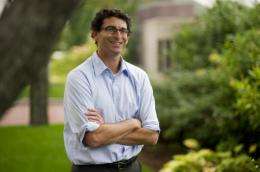Are we justified in our fights to save endangered species?

Even under the most opti¬≠mistic climate-‚Äč‚Äčchange sce¬≠narios, species loss may reach 30 per¬≠cent by the end of the cen¬≠tury, according to Ronald San¬≠dler, asso¬≠ciate pro¬≠fessor of phi¬≠los¬≠ophy in the Col¬≠lege of Social Sci¬≠ences and Human¬≠i¬≠ties.
In "," a new book pub­lished by Cam­bridge Uni­ver­sity Press, San­dler argues that rapidly changing ecosystem con­di­tions make it unfea­sible and eth­i­cally inap­pro­priate to main­tain species preser­va­tion as a pri­mary ecosystem man­age­ment goal.
"In many cases, the more jus­ti­fied thing to do is to let sys­tems tran­si­tion and recon­figure," said San­dler, the director of North­eastern University's Ethics Insti­tute.
Many of the cur­rent con­ser­va­tion efforts remain appro­priate, according to San­dler, including pro­tecting the wilder­ness and estab­lishing wildlife cor­ri­dors. But he said efforts to pre­serve species endan­gered by cli­mate change are a costly and inef­fec­tive protocol.
This stance is part of the book's broader dis­cus­sion of the value of species and the eth­ical sig­nif­i­cance of species bound­aries in the areas of envi­ron­mental con­ser­va­tion and biotech­nology. In the latter case, issues of species mod­i­fi­ca­tion and the cre­ation of new species through genetic engi­neering are essential.
"There is nothing intrin­si­cally prob­lem­atic with genetic mod­i­fi­ca­tion," San­dler said. "The impor­tant eth­ical ques­tion isn't 'Is it genet­i­cally mod­i­fied,' but rather other issues like human rights and public health."
To explain his view­point, he used the example of two dis­tinct genet­i­cally mod­i­fied organ­isms with vastly dif­ferent social impli­ca­tions. The first is a genet­i­cally mod­i­fied grass cre­ated to improve golf fairway con­di­tions that's resis­tant to her­bi­cide and can quickly spread to other areas. The organism has the poten­tial to be eco­log­i­cally dis­rup­tive and ben­e­fits golfers almost exclusively.
On the other hand, a genet¬≠i¬≠cally mod¬≠i¬≠fied yeast strain cre¬≠ated to pro¬≠duce artemisinic acid, a pre¬≠cursor to an effec¬≠tive anti¬≠malarial drug, helps people in low-‚Äč‚Äčincome coun¬≠tries by addressing their basic health needs.
When you look at the com­plete eth­ical pic­ture of biotech­nolo­gies, San­dler said, "the fact that they are genet­i­cally mod­i­fied is not that significant."
With respect to humans, many people have argued that the Homo sapiens species has spe­cial moral sig­nif­i­cance that sets it apart from other species. San­dler, on the other hand, believes that value is found in the cog­ni­tive and psy­cho­log­ical char­ac­ter­is­tics of human beings and not in the species itself.
Sup­pose a new species were to emerge through bio­med­ical research that had com­pa­rable abil­i­ties to empathize, think, feel and under­stand the way humans do. For San­dler, this bio­engi­neered species would be con­sid­ered as valu­able as the human species.
"What mat­ters are the capac­i­ties that indi­vidual human beings have," he said. "The reason we should be more con­cerned about the wel­fare of a human being isn't because it's Homo sapiens but because of their cog­ni­tive and psy­cho­log­ical capacities."
Provided by Northeastern University



















